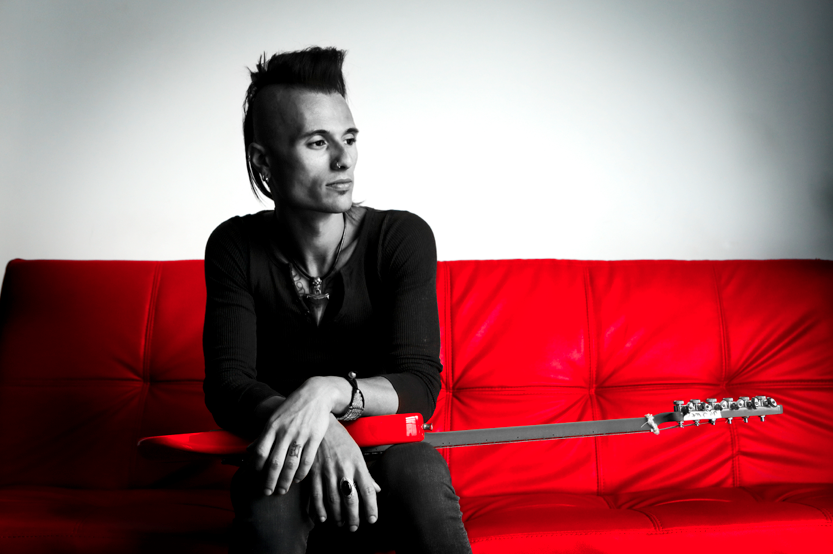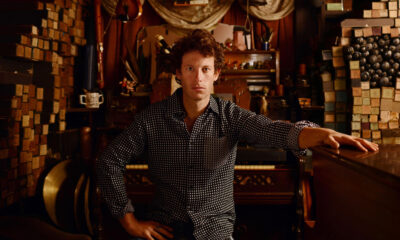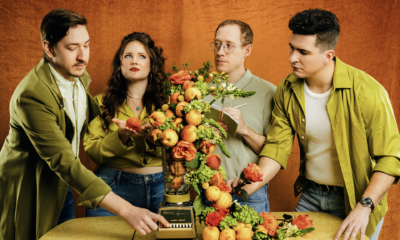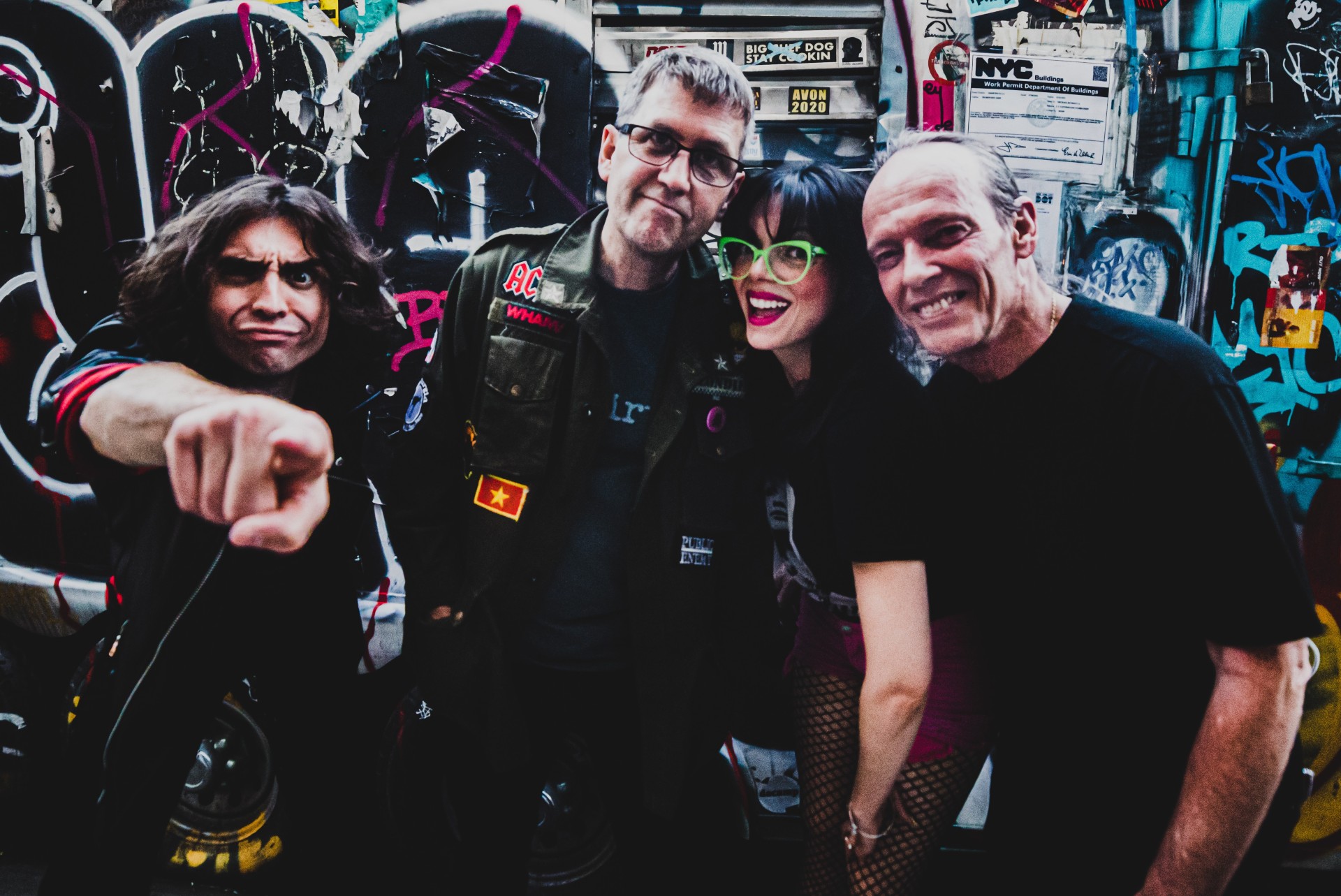Interviews
Interview with Sal Costa of Smashing Satellites – July 8, 2015 – Toronto, Ontario

By Vanessa Markov
http://smashingsatellites.com/
Sal Costa is better known as the former guitarist of the now defunct Canadian rock band My Darkest Days, but that may change in due time. After months of soul searching following the tough decision to leave the highly successful band in 2013, Sal has re-emerged as the frontman, writer, and co-producer of the brand new electronic pop rock band, Smashing Satellites.
He’s currently promoting their debut album, SonicAluzion, in the states, but I was fortunate to catch him for a coffee break during his return to Toronto a couple of weeks ago.
Immediately, Sal establishes that My Darkest Days was an incredible experience that helped him attain some of his wildest dreams, but, at the end of the day, what the band had become wasn’t who he was:
“My Darkest Days was a cock rock band. That wasn’t who I was, and after a while I just couldn’t take it anymore. Ultimately, I never felt I was reaching my potential or felt I’d be able to do so in that band – that’s why I left. Creatively, I was never going to be able to achieve what I wanted, so I left to write the music I’ve always wanted to write, and have been writing.”
Having never been a fan of My Darkest Days (for no good reason other than it simply wasn’t my thing), I was curious to see what Sal would come up with on his own – the results are very different (and awesome!). I asked Sal to describe the inspiration behind his style of writing, which reveals a side of him we’d never have seen in his former roles:
“I grew up with two sisters who are ten and twelve years older than me, so when I was a little kid, my friends sisters were listening to Spice Girls and Hanson while my sisters were giving me Placebo and Nirvana records,” he explains. “But then my mom, who was a poet, would give me all this really cool lyrical advice. She was obsessed with bands like Michael Jackson, The Bee Gees, The Eagles, stuff like that. So I had this mixture of listening to music with my sister, and then I’d sit down with my mom who’s telling me about the importance of words and showing me all these really cool disco records and whatnot. So that was the music I always wrote.”
Like most musicians, hitting the big time is never really something you expect to happen. But when it did happen for Sal, he learned a hard lesson from which we should all take note:
“I thought that once I got to the level where My Darkest Days was at, I would feel I’ve achieved everything, and that it would be a cakewalk from there. But as soon as I got to that point, I realized it’s just like any other job – I’m not happy. I was on tour with that band for almost 3 and a half years straight, and what I realized is that, whatever level you’re at, it becomes your new norm. So I either have to leave, or stay and be miserable. I ultimately made the decision to leave and it was a scary one.”
Even scarier for Sal was stepping up to the plate to become a frontman on his own project – something he never actually planned to do:
“It’s not like I thought, oh I’m gonna go create Smashing Satellites and be a solo artist. I just knew I wanted to leave the band, and when I left, I went through months of soul searching. I wasn’t really confident enough to be a lead singer, so I was writing all these songs and travelling, and I was getting other singers to audition to sing my music thinking I’d do what I did in My Darkest Days – play the guitar, co-produce, and have someone else sing the songs. But then people started telling me, ‘dude we like the demo version with you singing way better than anyone you’ve tried out’, and that’s kinda how I figured out that that’s what I wanted to do.”
While every member of a band has a crucial role to play, frontmen have always had the most pressure on them for totally natural reasons. For one, everyone’s eyes are on YOU; for two, your voice is your instrument. I mention that it must be a terrifying responsibility:
“Yeah, it really is – you’re at the mercy of something physiological. Like if I was on tour with My Darkest Days and I have the flu, I might throw up backstage before I got on and played a show, but I’m gonna be able to play the guitar. But if you’re a vocalist and your voice just gives out on you after you play a bunch of shows, there’s literally nothing you can do. Your band and you could put on an amazing show but your vocals are at the mercy of the gods, you know?”
Being smack in the middle of festival season, Sal’s comments on vocals had me thinking about countless popular bands I’d seen that were major disappointments in terms of vocals. I brought up how some bands will even down tune all their songs to hide their fading voice to get Sal’s opinion:
“Brutal – I hate thinking that people are paying to come and see us and I can’t give them 100%,” he responds instantly, adding, “People paid their hard earned money and waited a few months to see the show so it’s got to be great. Two hours before a gig, I will sit in the green room by myself if I can. I have a humidifier running all day and I just bask in it and try not to talk at all. Sometimes family and friends will be upset that they can’t get into my green room before the show, but people came here to see us do well and I have to save my voice for them. It’s tough – people end up resenting you sometimes, but at the end of the day, my music is who I am, and if I can’t deliver it the best way I can I just don’t want to do it.”
As a borderline obsessive music fan, as a supporter of local musicians, and as mentor to younger artists, I felt there was no better way for Sal to express the importance of respect for the fans that sustain his art. I thanked him for doing so, and he continued to explain that lack of respect is a dominating bad habit among successful musicians:
“When you’re doing well – not to be vulgar, but – the music industry will suck your dick. When you’re doing bad, they won’t even talk to you. But the fans are always there if you give them what they deserve. I’ve been in bands before where we’ve reached a level and everyone’s like ‘fuck them, I know there’s people waiting outside our bus and I’m not gonna go out there’. So I think a lot of artists get to a point where they’re like ‘fuck the fans, fuck everybody, we’re making money so we’re cool now’. But that’s a really short lived way to think. Even when I’m extremely tired and feel like shit I’ll stay until the last person is gone because I remember playing in front of 5 people, and if it wasn’t for these people I’d still be there.”
Such loyalty to his fans is already paying off in the sense that his new project is gaining fast momentum – something that is not necessarily common when members break off into new bands, especially when venturing into a new genre.
“The reason why I was even able to start Smashing Satellites in a somewhat quick fashion was because I had a lot of loyal people that respected me and that I respected. You can never underestimate the power of mutual respect. It’s a very sacred thing and I think a lot of artists forget that.”
I asked Sal to discuss any other glaring bad habits in the industry, and his answer was one I’ve been waiting for:
“When you start to become somewhat successful, drugs and alcohol become free and easily accessible, if not always accessible. It’s hard to avoid. I remember sometimes getting to shows on tour and the local promoter would have the local drug dealer getting stuff set up in your change room. If you are a weak person, it’s going to eat you alive very quickly.”
The topic of drug abuse in entertainment is one that is very close to my heart. It’s also a major topic of conversation lately, with so many young actors and musicians dying of abuse and misuse. I asked Sal if he agreed that the whole stigma of “Sex, Drugs, & Rock n Roll” was an outdated and self-destructive view to have of your own career:
“It is self-destructive. I’ve had people say to me ‘isn’t it so cool to just be able to drink and party for free?’ Not when it’s fucking up your body and personal life and all the people around you – it really isn’t. I can’t tell you how many people in bands we’ve toured with, big and small, who’ve had to be escorted off the stage because they’re just so fucked up. I’ve seen people who’ve had enough success to retire, and end up living in a trailer somewhere in middle America because they lost everything and everyone they had…What’s so cool about that?”
When put so eloquently, it’s hard to ignore the hard truth of it all. Drugs are not sexy or safe, regardless of how “big” you are. End of story.
But what about those who fall into drug abuse as a coping mechanism rather than a party lifestyle? I asked Sal which of the two scenarios was more common:
“It’s a bit of both. One thing that touring musicians lose sight of is when you’re touring, you live in your own universe. I’m living in a different city every day, on a plane or a bus, playing shows, doing all these things. Just to be able to do it, you supplement yourself with really bad things, and a lot of the times you feel it’s a necessity but it isn’t – it’s a mental thing you have to get over.”
Sal admits his own brief struggles and what he learned from it:
“There was a period where I wouldn’t say I became addicted, but I felt I needed to take a decent amount of Nyquil to get enough sleep to fit our schedule and be able to play. I was like holy fuck I’m taking this every night, and realized it’s not normal. And that’s Nyquil…you can take it way further. Just because you see people doing it all around you doesn’t make it normal or ok. On the other hand, a lot of times it’s people coming from nothing and suddenly having access to things they never had before, and before they know it they’re hooked. I’ve watched it happen to so many people and it’s a really sad thing. You see them go down, their talent goes down, physically they deteriorate and then their lives…it’s happened to so many people I know. I don’t want to be a part of that.”
“I come home and see my parents and sisters and neices and think, this is really what life is about. Having good friends and family, people that care about you is what it’s all about,” he continues, revealing more about what it’s like to be lonely on the road:
“You start to think that people who give you things are the people who care about you. Sometimes, when you’re on the road, you just want some comfort, but when someone gives you something it’s almost never for the right reasons – they’re trying to gain access and a story to tell their friends while you’re trying to gain comfort. Same thing goes for sex on the road. A lot of times you do it because it’s comforting but not necessarily good.”
This got me thinking about the other side of the coin when it comes to respect – the fans. Sal isn’t wrong by saying a lot of fans just want a piece of you without acknowledging the human being behind the person on stage. Having been a music obsessed teeny bopper myself, I can totally relate the feeling of wanting that keepsake or story to tell from that super hot musician. But is it worth it when you hear Sal’s point of view? I think we can all agree that being mistreated by an artist we love would be devastating – can you imagine how alienating and confusing it can be for an artist to be treated like a souvenir (or screwvenir, for that matter) by someone who idolizes their art? Damn.
I asked Sal if he had any advice for bands that are just starting out. His first response is to nix the tour plans until you have a base audience in several towns or cities:
“The thing is you have to start to create a story. The old school way of doing things would be to rent a van and just travel all over and you’ll start to make fans. But the truth is people don’t go to see live music like they did back in the 80s or even 90s. The reality is people don’t just show up anymore. So I think that’s a waste of money for new bands. What I’ve done with this project is I’ve tried to start it on a local level. For example, we’ll get some radio play in Albuquerque, New Mexico, and we’ll go and infiltrate that market by first playing for a smaller group of people, then a larger one, and then the radio station starts to play you more until you become a success story in that area. Then you can go and start to build that story in another city, and so on and so forth until you’re at the point where you can tour.”
With radio being almost as difficult to infiltrate these days as major labels, I asked what bands who aren’t yet getting any radio play can do to build some clout:
“When you’re a new band that isn’t getting radio play, the internet is also a very powerful thing as well. Walk Off The Earth did a cover of a very popular song, but they also did it very well – it was quality. So now when people search for ‘Somebody I Used to Know’ they’re going to click on that video and WOTE gets a share of that artist’s fans. The power of YouTube is huge and I would focus my energy on getting my performances up there and figuring out a way to promote them virally because that’s like a show. Instead of spending fifteen thousand to tour Canada for nobody, spend like five thousand and promote a great video. You’ll probably garner more fans that way.”
Speaking of Canada…
“I was watching Just For Laughs, and the MC for the night was introducing the next comedian and said, ‘This comedian is actually a Canadian that moved to America to come back and make it in Canada’ – I thought that was pretty funny because there’s a lot of truth to it. Canada is a hard country to get started in. You’d think it’d be easier because it’s smaller, but Canada wants a story from America, so you have to go a bit south of the border to create a buzz and then bring it back to Canada.”
With Smashing Satellites working under an independent label, Aluzion Records, I was curious for Sal’s opinion on the differences between working with major and indie labels, and if he could shed light on the major labels nasty reputation as being ‘evil’:
“I think a lot of people mistake record labels and the people who work there for the people who are at the very top of the music business. Those few people are cushy and safe, but all the people below them who work at the label – they’re not. Their jobs are very disposable and I’ve seen through my own experience a whole staff being changed like 3 times. It’s not really fair to say it’s the major labels fault. There are 4 or 5 people that control the entire industry and then everybody else within it – agents, artists, managers, and people at the labels – are all really chasing the same thing; to be able to succeed and make a living doing it.”
“Honestly, anybody in the music industry that’s on the business side is there to make money – period,” he continues. “So yeah, major labels are ‘evil’ but they’re also necessary a lot of the time. They just follow the money because if they don’t, their jobs are on the line. I have very good friends who worked at major labels, and there’s the artist perspective which is ‘man they shelved our record because it wasn’t doing well’ but then there’s also the other person’s side of the story which is ‘we spent x dollars trying to make it happen and it’s not, and I’m responsible for this and if I waste another few hundred thousand trying to make it go and it doesn’t go, then I’m out of a job, and I have a wife and kid at home that I have to support.’ When you hear it that way, you see they’re in the same position as the artist a lot of the time.”
As for indie labels…
“There isn’t much of a difference. If you’re doing well, people are going to keep throwing money into it to get it to the next level. If you’re not, people back off. Everyone likes hearing the underdog story about the cool independent label that pushed this band and just did it, but a lot of the time you’ll actually find out, if you follow the business trail, that the independent label was the first one to the party, but when it gets to the next level and you need those contacts, it’s usually a major label that gets involved. Even with Nirvana, everyone was like ‘Sub Pop did it’, but Sub Pop was bought out by Geffen Records when Nirvana was starting to get big in Seattle, and it was essentially Geffen Records that made them an international success. So I guess you can’t really dodge them. They’re the dinosaurs of the industry, they have all the contacts. It’s cool to foster something on an independent label first though, because then you might have some extra bargaining chips when it comes to contracts with major labels.”
After about a half hour laden with a lot of surprising insight and lessons, I was inspired me to close off my conversation with Sal by asking what is the biggest lesson he feels he’s learned from his experiences so far:
“No matter what level you get to, you have to always work hard. People don’t care about My Darkest Days in the genre that I’m trying to make this work in now, so I’m starting all over again from scratch and am on equal playing field with anybody. Having to start all over again has made me remember that hard work and honesty will take you where you want to go. If you work hard and follow your gut, you will eventually find success.”
Smashing Satellites is hoping to set up a Canadian tour for Fall 2015. In the meantime you can check out their debut record which was released on June 16.
-

 Music3 days ago
Music3 days agoTake That (w/ Olly Murs) Kick Off Four-Night Leeds Stint with Hit-Laden Spectacular [Photos]
-

 Alternative/Rock5 days ago
Alternative/Rock5 days agoThe V13 Fix #010 w/ High on Fire, NOFX, My Dying Bride and more
-

 Hardcore/Punk2 weeks ago
Hardcore/Punk2 weeks agoHastings Beat Punks Kid Kapichi Vent Their Frustrations at Leeds Beckett University [Photos]
-

 Culture2 weeks ago
Culture2 weeks agoCirque Du Soleil OVO Takes Leeds Fans on a Unique, Unforgettable Journey [Photos]
-

 Alternative/Rock1 week ago
Alternative/Rock1 week agoA Rejuvenated Dream State are ‘Still Dreaming’ as They Bounce Into Manchester YES [Photos]
-

 Features3 days ago
Features3 days agoTour Diary: Gen & The Degenerates Party Their Way Across America
-

 Culture6 days ago
Culture6 days agoDan Carter & George Miller Chat Foodinati Live, Heavy Metal Charities and Pre-Gig Meals
-

 Music6 days ago
Music6 days agoReclusive Producer Stumbleine Premieres Beat-Driven New Single “Cinderhaze”












